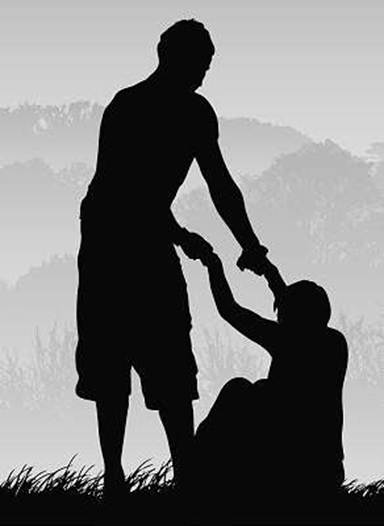To build great relationships treat people
the way you want them to treat you
Recently, I took my daughter Elizabeth out
to a restaurant for lunch. The waitress, whose job it was to take care of
people, made us feel that we were really inconveniencing her. She was grumpy,
negative, and unhelpful. All of her customers were aware of the fact that she
was having a bad day. Halfway through our experience I tried to change this
woman’s negative attitude. Pulling out a $10 bill, I said, “Could you do me a
favor? I’d like some change for this $10 bill because I want to give you a good
tip today.” She looked at me, did a double take, and then ran to the cash
register. After changing the money, she spent the next fifteen minutes hovering
over us. I thanked her for her service, told her how important and helpful she
was, and left a good tip.

To
build great relationships treat people the way you want them to treat you
As we left, Elizabeth said, “Daddy, did you
see how that lady changed?”
Seizing this golden opportunity, I said,
“Elizabeth, if you want people to act right toward you, you act right toward
them. And many times you’ll change them.”
Near the end of the Sermon on the Mount,
Christ summed up a series of profound thoughts “on human conduct by saying,
“therefore, treat people the same way you want them to treat you” [Malt. 7:12].
In this brief command, Christ taught us a
couple of things about developing relationships with others. We need to decide
how we want to be treated. Then we need to begin treating others in that
manner.
Here are five ways we all want others to
treat us. There’s not a person reading this who doesn’t need, like, or respond
to these qualities in others.
You want others to encourage you
There is no better exercise for
strengthening the heart than reaching down and lifting people up. Think about
it; most of your best friends are those who encourage you. You don’t have many
sttrong relationships with people who put you down. You avoid these people and
seek out those who believe in you and lift you up.

You
avoid these people and seek out those who believe in you and lift you up.
The story of Eugene Lang gives us an
ultimate example of encouragement. Entrepreneur Lang was Success magazine’s
“Successful Man of the Year” in 1986. The following is a part of a feature
article about Lange’s encouragement of others:
A gray-haired man stands in the center of
the auditorium stage – a distinguished, paternal presence sporting a fine wool
suit and the barest trace of a moustache. He scans the sunlit room, with its
peeling paint and frayed draperies, but his gaze lingers on the people.
They are Black and Hispanic men and women
who fill most of the seats in the auditorium. Though some do not speak English,
their attention is fixed on the man on the podium. But his speech is not aimed
at them. He has returned to this place where he once was a student to address
the 61 graders, dressed in blue caps and gowns, who are seated in the front
rows.

Forget
about yourself to help others.
“This is your first graduation – just the
perfect time to dream,” ha says. “Dream of what you want to be, the kind of
life you wish to build. And believe in that dream. Be prepared to work for it.
Always remember, each dream is important because it is your dream, it is your
future. And it is worth working for.”
“You must study,” he continues. “You must
learn. You must attend junior high school, high school, and then college. You
can go to college. You must go to college. Stay in school and I’ll …” The
speaker pauses, and then, as if suddenly inspired, he blurts out: “I will give
each of you a college scholarship.”
For a second there is silence, and then a
wave of emotion rolls over the crowd. All the people in the auditorium are on
their feet, jumping and running, cheering and waving and hugging one another.
Parents rush down the aisles to their children. “What did he say?” one mother
calls out in Spanish.
“It’s money! Money for college!” her
daughter yells back with delight, collapsing into her parents’ arms.
The place was an elementary school in a
poverty-stricken, drug-ridden, despair-plagued Harlem neighborhood. The speaker
was multimillionaire entrepreneur Eugene Lang, who 53 years earlier had
graduated from that very school.
The date was June 25, 1981, and the big
question was whether the warm and ever-confident Lang, a man who believes that
“each individual soul is of infinite worth and infinite dignity,” would fulfill
his promise.
Well, he did and he still is. Of 61
graduates, 54 stayed in contact with Lang, and 90 percent of those achieved a
high school diploma or equivalent, and 60 percent went on to higher education.
You have to understand, at that time, in that community, the high school
drop-out rate was 90 per cent.
People need to be encouraged. Eugene Lang
believed in these kids and it made all the difference in how they lived the
rest of their lives.
The happiest people are those who have
invested their time in others. The unhappiest people are those who wonder how
the world is going to make them happy. Karl Menninger, the great psychiatrist,
was asked what a lonely, unhappy person should do. He said, “Lock the door
behind you, go across the street, find someone who is hurting, and help them.”
Forget about yourself to help others.